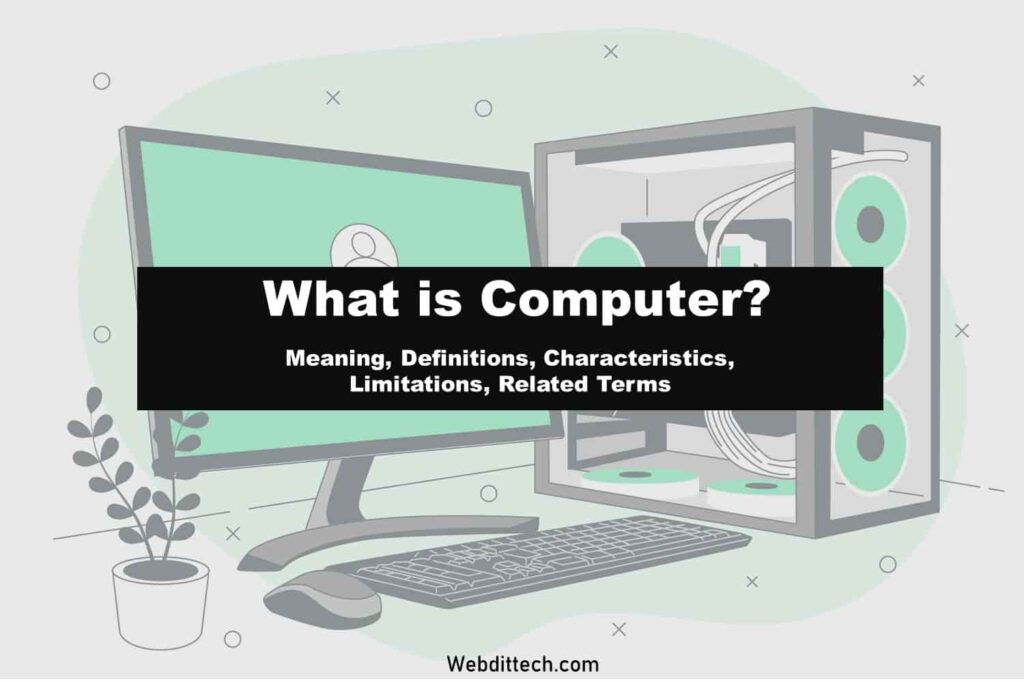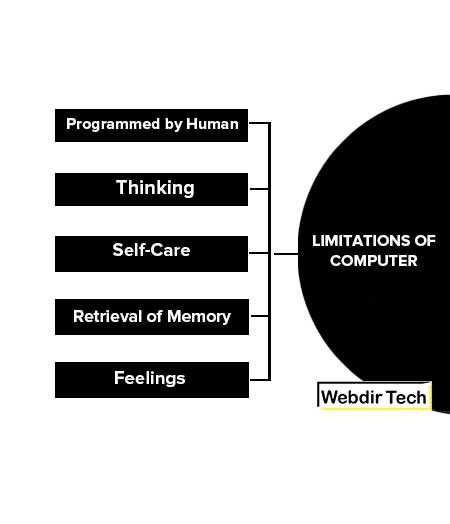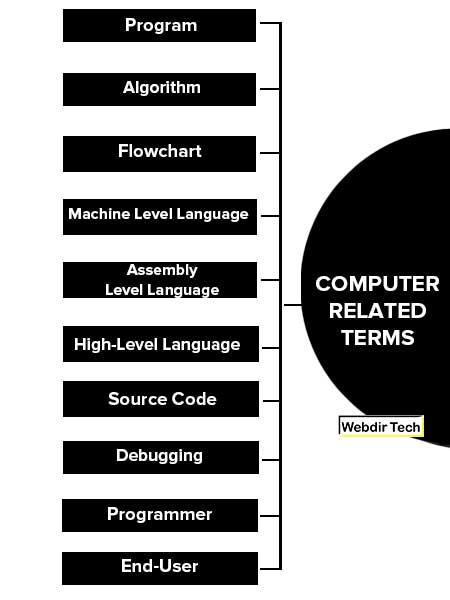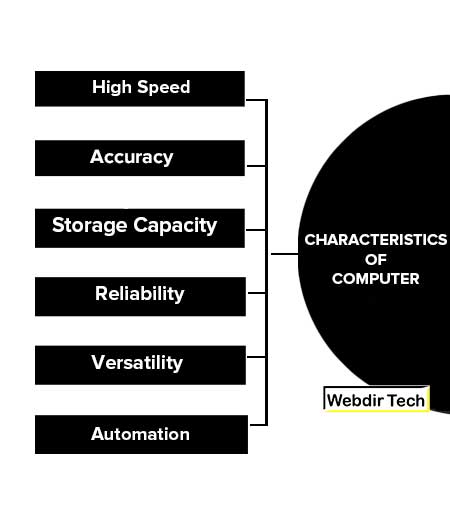What is a Computer?
A computer is a programmable machine that receives input, stores and manipulates data, and provides output in a useful format. We can say a computer is an information-processing machine. It can perform arithmetic operations (Addition, Subtraction, Multiplication Division, etc.) and make logical decisions.
It has a memory and can store a lot of information. The stored information may be retrieved, moved, and operated upon as desired. Computations are done at an extremely fast speed with complete reliability and accuracy. A computer can do some work only when it is supplied with instructions and required data.

Without proper instructions or commands, it just cannot do anything. It does exactly what it is instructed to do, nothing more and nothing less. It has not any thinking power, but only ‘obeying’ power. We communicate with a computer with the help of Input/Output devices.
Definition of Computer
These are the following definitions of computer by authors:
A device used for computing; specifically, an electronic machine which, by means of stored instructions and information, performs rapid, often complex calculations or compiles, correlates and selects data.Webster’s Dictionary
A data processor that can perform substantial computation, including numerous arithmetic and logic operations, without intervention by a human operator during the run.International Standards Organisation (ISO)
A device capable of solving problems by accepting data, performing described operations on the data and supplying the results of these operations.US Institute of Computer Sciences
Characteristics of Computer
Today the computer plays a major role in modern society and its development. The characteristics that make a computer possible to play such a vital role.
These are the characteristics of computer:
- High Speed
- Accuracy
- Storage Capacity
- Reliability
- Versatility
- Automation
High Speed
Since electrical pulses cause all the operations of the computer, the computers can perform a large number of operations in just one second. The processing speed of a computer is generally measured in Nano seconds.
Since computers are electronic devices and work with electrical pulses which travel at incredible speed and hence their internal speed is also virtually instantaneous. The speed of the processing varies with the computer hardware.
Accuracy
The accuracy of the computers is consistently very high. Computers do not make mistakes. Errors cause in computing are generally due to negligence, such as inaccurate data, improper procedures, poor designs, etc.
Storage Capacity
Computers have a very large storage capacity. Computers can store large amounts of data and information, which is expressed in terms of kilobytes, megabytes, and gigabytes in memory.
Moreover, the storage capacity of the computers can be increased by using secondary storage devices such as magnetic disks. The information stored in the secondary storage devices can be retrieved quickly with the help of main memory (RAM).
Reliability
The computers give very accurate results with predetermined values. They correct and modify the parameters automatically and give suitable signals. They give formatted results with a high degree of precision.
Versatility
Computers are very versatile machines with manual and automatic controls. They are capable of solving any problem and can be applied in all sorts of business and other activities.
Automation
The special feature of a computer is automation, i.e., the computer executes a program continuously without any human intervention until completion. The central processing unit of the computer makes it possible.
Limitations of Computer
The computer can outperform human beings in speed, memory, and accuracy but still, the computer has limitations. There are the following limitations of computers:
- Programmed by Human
- Thinking
- Self-Care
- Retrieval of Memory
- Feelings

Programmed by Human
Though the computer is programmed to work efficiently, fast, and accurately it is programmed by human beings to do so. Without a program, the computer is nothing. A program is a set of instructions.
The computer only follows these instructions. If the instructions are not accurate the working of the computer will not accurate.
Thinking
The computer cannot think itself. The concept of artificial intelligence shows that the computer can think. But still, this concept is dependent on a set of instructions provided by human beings.
Self-Care
A computer cannot care for itself like a human. A computer is dependent still on human beings for this purpose.
Retrieval of Memory
A computer can retrieve data very fast but this technique is linear. A human being’s mind does not follow this rule. A human mind can think randomly which a computer machine cannot.
Feelings
One of the main limits of the computer is feeling. A computer cannot feel like a human. A computer cannot meet humans in respect of relations. Humans can feel, think and care but a computer machine itself cannot.
A computer cannot take place of humans because a computer is always dependent on humans.
Computer Related Terms
These are the following computer related terms that might help to understand how computers are works:
- Program
- Algorithm
- Flowchart
- Machine Level Language
- Assembly Level Language
- High-Level Language
- Source Code
- Debugging
- Programmer
- End-User

Program
A set of instructions that a computer executes to perform a series of actions or a particular type of work.
Algorithm
A finite sequence of steps for solving a problem or performing a task.
Flowchart
A graphical representation of the path of control of the operations in a program. Symbols such as squares, diamonds, and ovals represent various operations.
These symbols are connected by lines and arrows to indicate the flow of data or control from one point to another. A flowchart is an aid to show the way a proposed program will work and as a means of understanding the operation of a program.
Machine Level Language
The program is written in terms of only 0 and 1. Machine language is directly executable by a computer. But it is machine dependent that different computers need a different program.
Assembly Level Language
The program is written in terms of shortcodes namely mnemonics. To execute this program a translator called an assembler is needed to convert from assembly language to machine language.
This type of language is also machine dependent. The machine and assembly languages are called low-level languages.
High-Level Language
The program is written in languages such as C, C++, and Java. To execute this program a translator called a compiler or interpreter is needed to convert from high-level language to machine language.
Source Code
Human readable program statements are written by a programmer or developer in a high-level or assembly language that is not directly readable by a computer. Source code needs to be compiled into object code before it can be executed by a computer.
Debugging
To detect, locate and correct logical or syntactical errors in a program.
Programmer
An individual who writes and debugs computer programs.
End-User
The ultimate user of a computer or computer application in its finished form.
Importance of Computers
The computer is a truly wonderful machine. Few tools can make you perform so many different tasks. Whether you want to pay your bills, reserve an air ticket, track your investment, design a building, play music or videos, work on your project, or be in touch with your friends, you can use a computer to do it.
The computer has taken on a role in nearly every aspect of our lives. Here are just a few personal benefits you can enjoy by developing a mastery of computer technology.
The following are the importance of computers:
- Improved Employment Prospects
- Greater Self Sufficiency
- A Foundation of Knowledge for a Lifetime of Learning
- Skills That Span Different Aspects of Life
Improved Employment Prospects
Computer related skills are essential in many careers. Whether you plan a career in automotive mechanics, nursing, journalism, video production, or banking, having computer skills will make you more marketable to prospective employers.
Greater Self Sufficiency
Those people who truly understand computers know that computers are tools-nothing more or less. We do not give up control of our lives to computer systems; rather we use computer systems to suit our needs. By knowing how to use computers, you can actually be more self-sufficient, whether you use computers for research, communications, or time management.
A Foundation of Knowledge for a Lifetime of Learning
Basic computing principles have not changed over the past few years, and they will be valid well into the future. By mastering fundamental concepts and terminology, you will develop a strong base that will support your learning for years to come.
Skills That Span Different Aspects of Life
Many people find their computer skills valuable in many places other than their work. It is not only sufficient to be literate but now it has become necessary to be computer literate to better handle your presence and performance in different aspects of life.
Computers have reshaped our lives at home, work, and college. The vast majority of businesses now use computerized equipment in some way, and most companies are networked both internally and externally. Our homes are getting equipped with PCs and internet connectivity day by day.
FAQs About What is Computer?
What is the meaning of computer?
A device used for computing; specifically, an electronic machine which, by means of stored instructions and information, performs rapid, often complex calculations or compiles, correlates and selects data.
What is the definition of computer?
A device used for computing; specifically, an electronic machine which, by means of stored instructions and information, performs rapid, often complex calculations or compiles, correlates and selects data. by Webster’s Dictionary
What are the characteristics of computer?
The following are the characteristics of computer:
1. High Speed
2. Accuracy
3. Storage Capacity
4. Reliability
5. Versatility
6. Automation.
What are the limitations of computer?
The following are the limitations of computer:
1. Programmed by Human
2. Thinking
3. Self-Care
4. Retrieval of Memory
5. Feelings.

